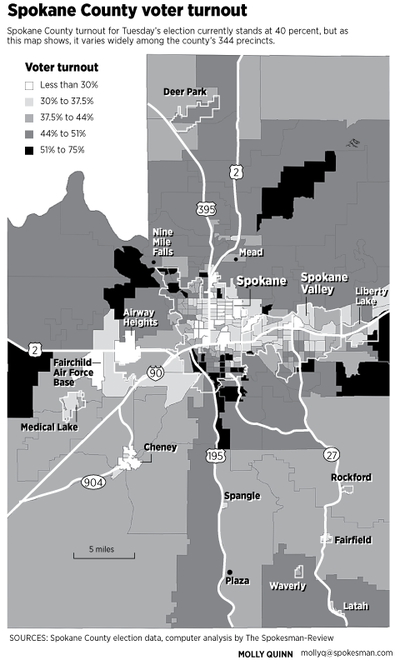Analysis: Election results suggest redder future for Spokane County

There was a point Tuesday night when Spokane-area Democrats gathered to watch the election returns had little to cheer about except the likely passage of a statewide initiative requiring broader background checks on gun sales.
Spokane County returns were showing that incumbents in the reliably Democratic 3rd Legislative District were coasting to re-election, and long-term County Auditor Vicky Dalton was headed for another four years.
Beyond that, however, it was a solidly Republican night around the county. U.S. Rep. Cathy McMorris Rodgers was easily re-elected to a sixth term. All other courthouse positions were once again going to Republicans, and a state Senate seat that could have helped Democrats regain control of that chamber in Olympia easily was held by Republican freshman Mike Baumgartner.
A precinct-by-precinct analysis of votes counted so far suggests Democrats should get used to that pattern without some major change in strategy. As usual, many Democratic candidates did well in the city of Spokane but lost convincingly in the city of Spokane Valley, the suburbs and rural areas.
That’s good for Republicans and bad for Democrats for two reasons that come down to basic election math:
If population trends of recent years continue, Spokane County’s growth is going to be outside the city, so it will become a shrinking part of the total electorate. The precincts that vote reliably Democratic had some of the lowest turnout this year, as they do almost every election.
The 3rd Legislative District, which is most of north Spokane, downtown and the lower South Hill, has about 12,000 fewer registered voters than either of the strongly Republican 4th and 6th districts. Of the ballots processed so far, 3rd District turnout is about 7 percentage points behind the 4th District and 10 points behind the 6th.
Ballots will continue to come in and be counted for nearly two weeks. But history suggests that spread is not likely to change significantly. Neither are the relative strengths of the candidates.
Mary Lou Johnson, who challenged Al French, a first-term Republican county commissioner, did well in the city of Spokane, some parts of the west Valley and a couple of precincts in Cheney. But she didn’t do well enough to overcome vote totals French piled up in precincts in the rest of the city of Spokane Valley, Liberty Lake and the suburbs north of Spokane. The result: French had 54 percent of the vote at Wednesday evening’s tally. Johnson conceded the race.
For other Democratic candidates, the races were over at about 8:15 p.m. Tuesday. Rich Cowan, the 6th District Democratic Senate hopeful who had been knocking on doors in an effort to get a few more votes just an hour earlier, shook his head and said he’d done the best he could.
For Cowan and other Democrats in the 6th, 43 percent of the vote might be the best they will do until district lines are redrawn after the 2020 census. The lines were redrawn three years ago to make it more Republican, just as the 3rd was made more Democratic.
The pattern for Democrats was repeated, with some changes in the precinct results, for county treasurer, prosecutor and clerk: Win the city of Spokane, lose almost everything else.
It was similar for Joe Pakootas in the U.S. House race, which should reinforce for state and national Democrats that they can’t retake the 5th Congressional District without picking up big numbers in all of Spokane County.
It isn’t just money, and an R after a candidate’s name isn’t a guarantee of election, as Dalton proved. She is far ahead in most precincts in the city of Spokane but also leads in most of Spokane Valley and the West Plains despite being outspent nearly 3-to-1 by Republican Alene Lindstrand.
To be competitive in the foreseeable future, the party will need county and congressional candidates who are better aligned with Spokane County’s conservative – although often independent-leaning – political views. They’ll also have to do a better job of registering voters in the precincts that traditionally support them in north Spokane and getting them to cast the ballots that come in the mail.